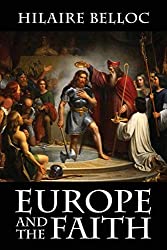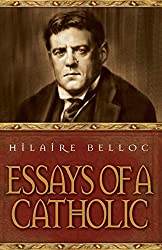
We are engaged in an ongoing series of reviews at this blog – reviews of the books by Hilaire Belloc, which have shaken me to my core …
Now, many of these reviews are extensive indeed with long passages from Belloc, which I would like to restore, at least a little, to public consciousness. See, for example, my lengthy review of his book Monarchy, wherein Belloc contrasts the French Catholic monarchy with the English Protestant spirit which helped give birth to modern capitalism.
And now I look to another book by Belloc on Catholic France, which also turns on the conflict between the French and English spirits. But this time, however, I shall keep things short and sweet.
For the Belloc book I would pay a little tribute is, in fact, short – and I do find it sweet, strangely haunting.
It is Belloc’s very brief history of Joan of Arc, wherein he tells the astonishing story of that great French saint and mystic, who, guided by voices from heaven, became that most unlikely of things – a Fifteenth Century female warrior leading armies into battle and liberating France from the English.
And in the telling of this tale, there is sad yet sweet poignancy. It is by far the most poetic book I have yet read from Belloc.
Now, amongst many, many other things (e.g. historian, politician, journalist, author’s of children’s books etc.) Hilaire Belloc was also a poet. (For some beautiful lines from his haunting verse, you may look to what I have quoted from him here at this site.)
However, until he wrote Joan of Arc late in his life, Belloc, as far as I know, had never attempted such an effective marriage between his historical prose and his profound poetic sensitivities.
Joan of Arc, then, tells a different kind of history. Certainly, it draws on the author’s enormous erudition in terms of French history and culture – but Belloc has set out to write not simply history, but also to evoke the lost world of Christendom …
To this end, he employs a language which is at once both slightly archaic and richly romantic. Nor does Belloc gloss over (as many a modern materialist historian would) the astonishing mystical side to the tale of St. Joan of Arc. Rather he speaks of it openly – yet always with poetry.
Sentences like these may indicate something of my meaning here:
There Joan besought [Charles] to forward at once to the crowning. For, as she had told him after they first met, St. Louis and St. Charlemagne were praying on their knees before the throne of God for him, of the blood royal, to whom anointed, all the realm would fall, till France was restored in splendour and Christendom at rest from wars.
And here is how Belloc writes when the voices guiding St. Joan in battle have ceased:
After the trumpets had sounded and the great church was silent, the voices never more gave orders from the field; but all Joan did thenceforward … came from herself alone, uncertainly.
Since from the beginnings in Domrémy, they had said: ‘Raise you the seige of Orleans and crown your Prince in Rheims’. But of battle beyond, they said nothing.
Yet were her brethren in Paradise in full communion with her, sustaining her through the evils of this world, and she still conversed with them, seeing them with her eyes, and she was supported by their shining presence at the end.
All of this, as we say, is quite untypical of Belloc’s prose, which is usually, well, much more prosaic. This little book was clearly a labour of love for him. Indeed, at least one biographer tells how lavished special care on this work, carefully honing and polishing it
All that extra effort and attention have created something really very beautiful, I think. It is one of the smaller jewels in Belloc’s oeuvre – but a scintillating one.

Buying Books at Amazon Through These Links Gives Us a Commission. This Supports Our Apostolate. Thank You if You Can Help Us Like This!





Comments
comments are currently closed
2 responses to “Joan of Arc by Hilaire Belloc (Review)”
One of my favorite sentences in all literature is the opening one of this beautiful book: “Once there was in France an old, mad king whose wife was a German harlot, mocking him.”
Of course, I love everything about Belloc, but that first sentence always haunts me.
Aged parent, thank you. Belloc’s prose could indeed rise to haunting lyrical beauty. Nevermoreso, in my experience, than this gem about St. Joan of Arc. However, I suspect you will have discovered many gems which I have yet to savour!
I am sorry it has taken so long to respond to this and to follow-up your very interesting blog.
For reasons mentioned in my most recent post (here), I felt it necessary to avoid the internet and this site as much as possible in recent weeks.
But I look forward to catching up with your site …